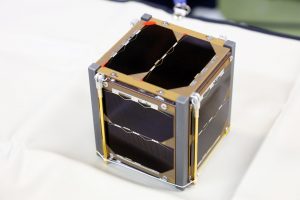
Miami, Apr 2 (efe-epa).- The first Central American satellite, manufactured in Costa Rica and known as “Project Irazu,” was sent into orbit on Monday aboard a SpaceX Falcon 9 rocket from NASA’s launch center at Cape Canaveral, Florida.
The rocket, which is on its second mission into space, lifted off at 4:30 pm for the International Space Station, where astronauts will be tasked with deploying the nanosatellite into the same orbit around the Earth occupied by the ISS.
The Falcon 9 is carrying almost three tons of supplies for the ISS, but Project Irazu takes up relatively little space on board, given that it was designed using the CubeSat standard, a light cubic structure weighing approximately 1 kilogram (2.2 pounds) and which fits in the palm of your hand.
The initiative was undertaken by the Central American Association of Aeronautics and Space (ACAE), which intends to develop the capabilities of Costa Rican professionals, as well as students, to mount space missions.
The region’s first mission, which initially sounded like “madness” when its organizers were planning it eight years ago, finally came to fruition on Monday thus heralding “the entry of Central America” into space, ACAE project manager Luis Diego Monge said in March.
The aim of Irazu will be to monitor climate change by gathering data about tree growth, and thereby establish a model for carbon fixing in the tropical forests of Costa Rica.
In 2016, a public campaign collected more than $80,000 to pay for part of the initiative, which cost a total of $500,000, a relatively low cost since Irazu is a nanosatellite, which for many experts constitutes the next wave in the development of space science.
It is expected that “Dragon” – the part of the rocket containing the cargo that separated from the Falcon 9 booster stage 10 minutes after launch – will arrive at the ISS on Wednesday.
The data collected by Irazu for at least the next six months in orbit will be transmitted several times a day back down to a ground-based station in the Costa Rican city of Cartago.
Before being sent into orbit, the small Irazu device was sent to Japan to undergo technical testing.
The reusable Dragon and Falcon 9 were sent into space before, in 2016 and 2017, respectively.
